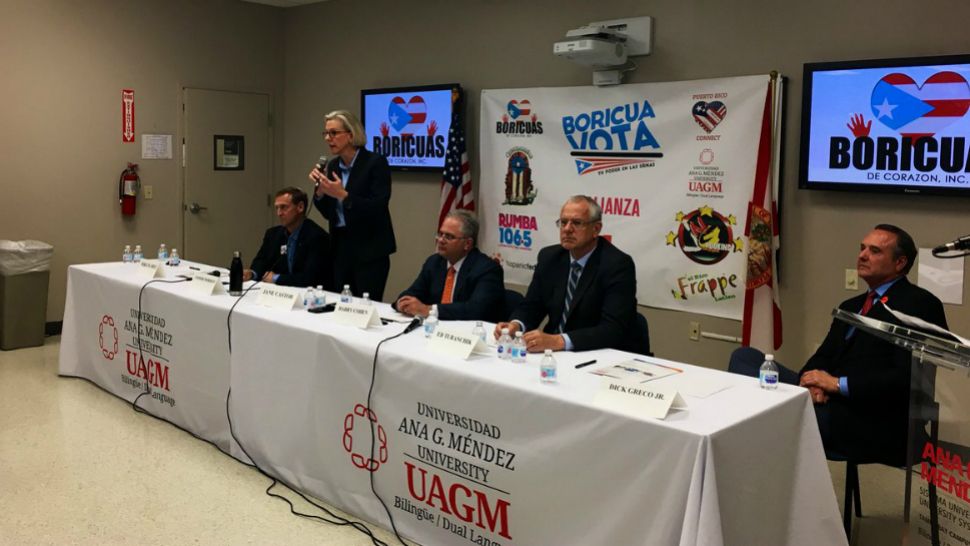TAMPA, Fla. — Hispanics make up about 28 percent of Hillsborough County’s population — and on Friday night, the people hoping to be Tampa’s next mayor addressed the concerns of that community.
Six of the seven Tampa mayoral candidates faced off in the city’s very first bilingual mayoral debate.
- PREVIEW: March 5 is Election Day in Tampa
- Candidates met Friday night in bilingual debate
- PREVIOUS: No Shortage of Amendments on Tampa Election Ballot
David Straz was originally scheduled to attend, but organizers told Spectrum Bay News 9 he canceled on Friday morning.
The debate focused on the various issues pertinent to the Hispanic community in Tampa.
All candidates agreed that Tampa needs to continue being an inclusive community.
Dick Greco Jr., Mike Suarez, and Topher Morrison added that the Mayor’s Hispanic Advisory Council needs to play a bigger role moving forward.
The candidates were asked what strategies they would come up with to help bilingual professionals.
Greco said he would go to entities like hospitals and the sheriff’s office to make sure they have enough bilingual staff members.
Both Ed Turanchik and Harry Cohen disagreed with that level of involvement.
“It’s not a function the city could take on, or should it,” Turanchik said.
- See a City of Tampa Election Sample Ballot (.pdf)
- Decision 2019: Spectrum Bay News 9 Politics
- Hillsborough County Supervisor of Elections page
“That doesn’t speak very highly of people’s leadership ability,” Morrison fired back. “Leaders get involved. Leaders want to make a difference, even if it’s not their responsibility.
Candidates also discussed the possibility of creating an office that would cater to the needs of the Hispanic community in Tampa.
Greco said it was a wonderful idea, mentioning how hard of a transition it was for the influx of Puerto Ricans following Hurricane Maria.
“Puerto Ricans are not Puerto Ricans. They’re Americans,” he said, and the audience burst into applause. “They deserve to be treated as Americans. We need to be prepared for things like that.”
Turanchik suggested partnering up with Hillsborough County in creating a consolidated office.
“Within 90 days, we’ll sit down with the county commission to get it done,” he said.
Cohen agreed, adding the city website is not as user friendly in Spanish and how that needs to change.
The focus then turned to creating more job opportunities for the Hispanic community.
Turanchik suggested working with the county to create a job placement program.
Mike Suarez brought up creating an apprenticeship program within the city, adding that it needs more Spanish speakers.
Morrison brought up how supporting small businesses would create more job opportunities.
Jane Castor referenced Senator Janet Cruz’s job fairs and how she would like to partner with her on that.
The last topic discussed: how each of the candidates plans on supporting the recent growth of the Puerto Rican population in Tampa.
All of the candidates agreed that the mayor plays an integral role in making them feel as welcome as possible.
“Whatever the city could take off of your plate, we would do. Whatever we could do to help,” said Castor. “I can’t imagine you’d be in a place you’re forced to flee and leave everything behind.”
“First thing, welcome them. They are a part of us,” Suarez said. “But it’s beyond that – make sure we can provide for them and the city can continue to grow.”
Turanchik said the city needs to continue to build up its infrastructure and get more cars off the road to better support a growing population.
“We’re so susceptible to storm surge, so let’s invest in that infrastructure to be resilient against storms so what happened in Puerto Rico doesn’t happen here,” Cohen added.
Morrison talked about how he’d call President Donald Trump to remind him that Puerto Rico is America so he should allocate more funding for the island.
Once the debate was over, audience members got to mingle with the candidates and ask them any questions left unanswered.
Data shows that Hispanics didn't turn out as strongly at the polls as expected during the midterm elections.
This is what spurred several Hispanic organizations in Tampa Bay to put together the bilingual debate.
“This gave (voters) the connection, cause they can see directly each one of the candidates that’s speaking to them and they feel connected. I think that we’re going to see a spike in voting because of this,” said Eliseo Santana, founder of Puerto Rico Connect.



